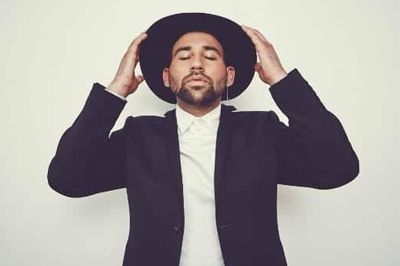Out gay musical artist Parson James, now based in Brooklyn, New York, has a story. And that story begins in conservative, rural South Carolina. He calls his music “conflicted pop gospel,” and one you know his past it just clicks.
Born Ashton Parson in a town called Cheraw, Parson James faced more than his fair share of struggles. His teen mother was thrown out of her house when her pregnancy was discovered, because the father of the child was an African American basketball player. But James’ mother prevailed through adversity, raising her son with the help of his paternal great-grandmother, while working three jobs.
For a while James’ father was around, but in the end she had to kick him out for drug abuse and stealing from her. “My dad was out of the picture after that,” James said. “When my dad left, he was in a very bad place.” One of his few vivid memories of his father was having to call the police on the man. “I knew how to call 911 when my dad was in the house and pretend I was speaking to my grandmother so he wouldn’t know I was calling for help.”
James knew he was gay from an early age, but also knew better than to come out too early. “I grew up in rural South Carolina–a very difficult place to be out. My town was about 5,000 people,” he explained, “super religious, super rooted in its Baptist belief: anything that’s kind of different than the way they were raised was kind of banished!”
Latent homophobia wasn’t the only societal ill James had to face. “Racism was a problem as well—and my family was interracial, so acceptance was hard to come by on both sides.”
While church was the source of many of his troubles, its music was a fascination and a comfort. “I have been singing as long as I can remember,” James said. “I never shut up. My first glimpses of music were in church, gospel and Baptist hymns. Church was an amazing place musically: some of the voices you hear there are ridiculously good.”
It’s little surprise though that, “Growing up, I didn’t connect with the message, but the passion and energy gave me a glimpse of what I wanted to do,” he explained. “At 10 I started to do talent shows, chorus and choirs. By 15 I was convinced I should be the next American idol. I tried multiple times and never made the first audition.”
Eventually, James said, “I got to a place where I was going nuts, and I knew that, even at a young age, I had to get out of there. So I moved to New York when I was 17. I got here, and there were so many people here… Quickly I came out of the closet: I went to my first gay bar and started seeing gay and lesbian relationships. I met the first trans person I had ever known. I spent a few years here learning about myself as a person, since I spent so much time in the closet growing up.”
When he first came out to her, he asked if she had guessed. She told him that she’d never questioned his sexuality, but that at some level she might have known. “Maybe I did,” she told him, “but when you’ve had the experience of being judged by your own parents, that's a feeling that you would never want to put on anyone else.”
How did he work up the courage to leave home and run off to New York in pursuit of music? “I was a bit delusional about my career,” James said with a laugh. “I thought, ‘This is just going to happen!’ Moving to New York at 17 was just the thing I was supposed to do. I signed up for a college I’d never heard of, but I never went to class. I went to open mikes and made relationships: I got connected to others, and eventually music industry.”
“I just kept myself completely busy and never looked up,” he explained. “When I did look up I had fallen into the hands of a really good manager. I found I needed to be more honest with my music, and once I did, labels got more interested and it allowed me to deliver my own personal message.”
James’ debut single from his EP The Temple reflects on this. The community had turned its back on his mother: “She was shut out by everyone. So on ‘Sinner Like You’ I’m asking, ‘What are we going to do?’ and recognizing the hypocrisy of the people in the community. The lady who drove me to school had a drug addiction. The preacher was caught sleeping with his wife’s sister. And somehow my being gay trumps that?”
James’ music received a huge boost, ironically, from American Idol. In its final season, Keith Urban suggested to contestant Trent Harmon that he should perform “Waiting Game”, also on The Temple, on the shows finale. “Starbucks had been playing the full EP,” James explained, “and [Urban] heard it there and talked about it on the show!” This rocketed the song to iTunes’ Top 10 that week, and James hasn’t looked back.
This year, James is playing Pride festivals in Nashville, New Jersey and New York, and he said, “I’ve never been to Nashville, so I’m excited to see some Southern queens. In South Carolina there wasn’t even a bar or club within three hours, so it’ll be a new experience. I’m excited!”
Photos by Koury Angelo
